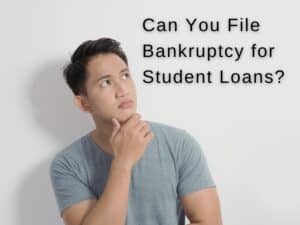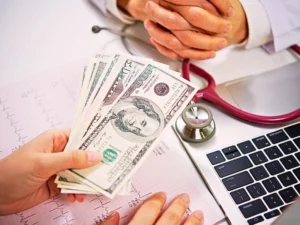
Can You File Bankruptcy for Student Loans
While it’s possible to file bankruptcy for student loans, it’s notoriously difficult to do so, making it important to know how to properly discharge these loans in a bankruptcy. Here, you’ll learn more about how to go about discharging student loans by filing for bankruptcy, including which chapter of bankruptcy you must file in these types of cases.

Can Student Loans Be Discharged in a Bankruptcy?
If you want to discharge
How Do Bankruptcy Courts Determine Undue Hardship?
The case of
Specifically, the following are the factors that this particular case has put into place:
- The debtor will be unable to keep up the “minimal” standard of living for both the debtor and his or her dependents if they must continue paying loans.
- The debtor has made an honest effort to repay all outstanding loans.
- The debtor will be unable to maintain the “minimal” standard of living for much of the loan repayment period.
When proving that last portion, there are multiple factors that may contribute to the debtor’s inability to maintain the “minimal” standard of living while attempting to repay his or her student loans. For example, the debtor may suffer from disabilities, a lack of education, or a lack of skills that allow him or her to seek meaningful employment.
If you can prove each of these factors in your case, you may qualify for a discharge as a result of “undue hardship,” enabling you to
What Happens After Proving Undue Hardship?
If you successfully prove to the court that you might suffer undue hardship by making student loan payments, you may benefit in a few different ways.
For example, the bankruptcy court may fully discharge your student loans, eliminating the need to continue making any payments. In other cases, the courts may decide to partially discharge loans, which would require you to continue paying some of your remaining loans. The court may alternatively decide to require you to continue making student loan payments, but with a lower interest rate or with other terms that make it easier to do so.
If you are unable to prove undue hardship, you may still have other options. Depending on your situation, you may be able to apply for another type of repayment plan that allows more flexibility in payments. This could make it easier for you to make all of your payments on time while easing your financial burden to a certain extent.
Which Chapter of Bankruptcy Should Be Filed?
When struggling to make payments on student loans, you may be able to file for bankruptcy. The specific type of bankruptcy you would file in these cases would be Chapter 13 bankruptcy. With the help of a
If you opt to file Chapter 13 bankruptcy, the bankruptcy court will treat your student loans as non-priority unsecured debts, making them somewhat similar to medical expenses and credit card bills. As a result, you wouldn’t need to pay them off entirely, as you develop a payment plan that allows you to pay off your debt in smaller increments.
There are two main ways
The Prohibiting of Student Loan Collection
Immediately after filing Chapter 13 bankruptcy, you will benefit from an automatic stay that prevents debt collectors from attempting to collect your student loan debt. This automatic stay will keep collectors from hassling you throughout your bankruptcy, which could last for as long as five years, depending on your circumstances.
Delayed Student Loan Payments
The Chapter 13 bankruptcy repayment plan will dictate how often you need to make payments on student loans. If you are entirely without any spare income that can go toward paying student loans, you may also avoid making any additional payments toward your plan. The downside to this is that interest rates will still apply, requiring you to pay loans plus interest after the automatic stay lifts.
What to Consider Before Filing for Bankruptcy
There are a few key considerations to keep in mind if you plan on filing for bankruptcy. These include:
Whether You Only Have to Pay Student Loan Debt
You aren’t as likely to win a bankruptcy case if you have no other debt to pay other than your student loans.
The Priority of Student Loan Debt
Before determining how much you will need to pay on your student loan debts, bankruptcy courts will consider the priority of your student loan debt compared to other types of debt. If your student loans are of a lower priority, you may need to pay higher interest on these loans.
The Type of Loan
The ability to settle or discharge your student loan debt will also depend on whether you’re paying a private or federal student loan. While private student loans don’t offer payment plans based on income, you may be able to pay varying amounts based on income with federal student loans.
Filing Fees
Unless the court chooses to waive them, you will need to cover certain filing fees if you decide to file for bankruptcy.
Keeping these factors in mind will help you decide if filing bankruptcy is the right move to make.
How a Student Loan Debt Attorney May Be Able to Help
If you’re unsure about how to relieve student loan debt when you’re unable to make payments, a
There are several ways an attorney in this practice area may be able to assist you when seeking to discharge student loan debt.
For instance, an attorney may be able to inform you of your rights and the specific options available to you regarding student loan debt relief. He or she may also be able to facilitate negotiations of student loans with various parties, including student loan servicers, holders, collection agencies, and administrative bodies.
Additionally, an attorney may be able to help you file bankruptcy for student loans with the courts. He or she may also have the ability to prevent debt collectors and other parties from harassing you when you’re trying to make student loan payments. If you need to take your case to court, the right attorney may also provide representation in this setting.
While it’s possible to
Ultimately, if you need to discover what choices you have when it comes to student loan debt relief, an attorney can sit down with you to discuss your case at no cost to you in a free consultation. Depending on the situation, you may be able to hire the attorney to help you handle your case.
Find Out Whether You Can File Bankruptcy for Student Loans
If you find that you’re facing financial difficulties and are unable to sufficiently pay off student loan debt, you’re not without options. You may have the ability to file for Chapter 13 bankruptcy or discharge your student loans by going through the bankruptcy courts, but it’s important to find out whether these options are right for you based on your situation.
By speaking with a






